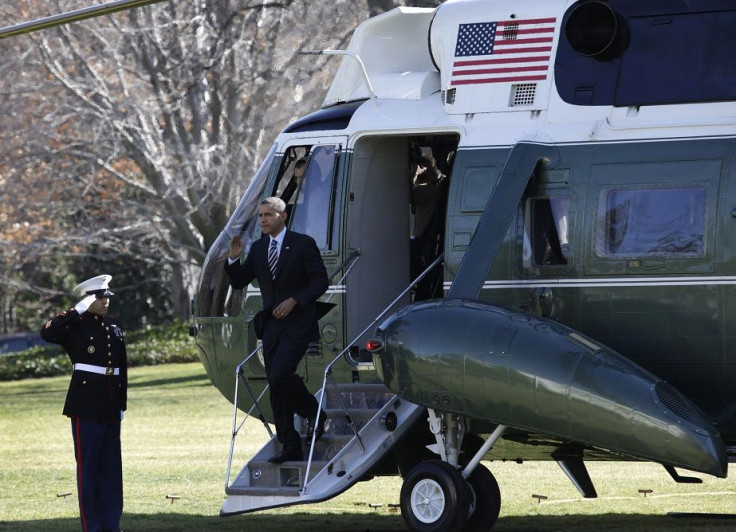In 2013 State Of The Union, Jobs Will Once Again Be Front And Center

President Barack Obama on Tuesday will deliver his fifth State of the Union address, in which the commander in chief is expected to look beyond political trends to outline a very familiar second-term agenda: bringing economic prosperity back to the middle class.
While gun safety and immigration reform have led the national political discussion so far in 2013, the New York Times reports the president will “move beyond the politics of the moment" to narrow his focus on initiatives intended to “recapture robust job growth and economic expansion,” unnamed White House officials told the newspaper.
With unemployment still hovering at 8 percent and an economy that actually contracted, not expanded, last quarter, it may not be a surprise that Obama will use his State of the Union speech to discuss his vision for economic improvement.
But jobs and the economy have occupied a starring role in his four previous speeches as well. In fact, as noted by the Huffington Post, Obama’s use of the word “jobs” has increased annually -- starting off at 14 mentions in 2009, and steadily growing to 33 by his 2012 address.
“I think you will hear him talk about some new proposals that build on his earlier efforts to help middle-class Americans,” Nancy-Ann DeParle, Obama’s former deputy chief of staff, told the New York Times, describing how the State of the Union will add to the national conversation. “I think his message will be -- as he is -- very positive and optimistic: ‘We’re strong, and we’re moving in the right direction. The economy is improving, but we have more work to do to ensure that all Americans can take advantage of a stronger economy.’ ”
Obama’s speech will reportedly be structured around three economic points: making the nation a hub for jobs and manufacturing, providing Americans with the training they need to excel at those jobs and, more vaguely, ensuring that “hard work leads to decent living.”
The White House has declined to provide more details regarding the initiatives included in Obama’s upcoming speech.
This time around, the president has another reason to focus on the economy -- the looming budget sequester, set to take effect on March 1.
The State of the Union will give Obama his last opportunity -- and largest audience -- to discuss those impending automatic spending cuts, which the Congressional Budget Office reports could reduce the nation’s GDP and, potentially, lead the nation into another recession.
Last week, Obama urged Congress to pass a small package of spending cuts and tax reform initiatives that would delay the sequester, which will otherwise occur unless the House and Senate are able to pass a budget before March 1. If they are unable to, approximately $85 billion in spending cuts -- which would cut funding from defense spending and domestic programs such as education, transportation and housing -- will run through Sept. 30. Another $110 billion in annual cuts would also begin on Oct. 1 and continue for eight years.
Like Obama, many Democrats argue that deep cuts to domestic programs could lead to significant job losses and gut funding from programs that largely assist lower-income and middle-class Americans. But Republicans, some of whom argue those very cuts are needed to reign in an overspending government, are already expected to lambaste Obama’s proposals in the party's televised response to the president’s speech. The response will be delivered by rising GOP star U.S. Sen. Marco Rubio of Florida.
In his second inaugural address last month, Obama made an aggressive case for a progressive domestic agenda, discussing the need for advancing gay rights, confronting climate change and creating an attainable path to citizenship for undocumented immigrants. The White House, which has told media outlets that Tuesday’s State of the Union will be a “second act” to the inaugural address, reports the upcoming speech will also tackle those pressing domestic issues.
In particular, Obama is expected to take advantage of the public opportunity to challenge Republicans on gun violence. Congressional Republicans have, so far, been reluctant to support additional firearm regulations in the wake of the December shooting massacre at Connecticut’s Sandy Hook Elementary, which killed 20 children.
Obama will renew his call for a broad package of legislation intended to reduce American gun violence, which include proposals to institute universal criminal background checks for gun buyers, limiting the sale of high-capacity ammunition magazines and preventing the sale of firearms to individuals with mental illness -- all proposals which have been found to have strong bipartisan support.
© Copyright IBTimes 2024. All rights reserved.





















